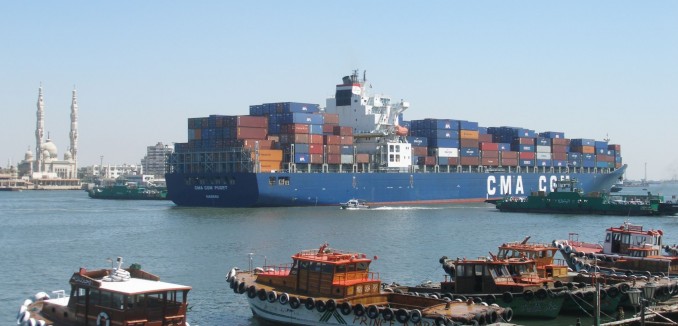Amid a faltering economy, Egypt is looking to Israel for economic assistance, with the two countries discussing a series of large-scale projects, Ynet reported Tuesday. The news is the latest example of increasingly-close ties between the two neighbors, who have reached a new level of cooperation under Egyptian president Abdel Fattah el-Sisi after decades of a distant, cold peace.
One of Egypt’s most pressing issues is the future of access to drinkable water. Nearly all of Egypt’s water is supplied by the Nile River. Ethiopia’s construction of a giant dam over the Nile’s headwaters, which is scheduled to be completed next July, has led to concern in Cairo that it will lead to a nationwide water shortage. The country is therefore turning to advice from Israel, a global leader in water technology, including in desalinating sea water and increasing the efficiency of pipelines and irrigation practices.
The report also noted that Israel “is also preparing to provide cooperation and assistance to Egypt in the fields of solar energy, electricity production, agriculture, irrigation and gas. Additionally, Egypt is also examining the possibility of extending its cooperation to the tourism sector, as the billions invested in an expansion program in the Suez Canal have yet to yield the expected revenue.” The Egyptian economy is heavily reliant on tourism, which accounts for around 11 percent of its GDP. But tourism levels have fallen sharply in the past five years, during which time Egypt has gone through two revolutions and a continued insurgency from a Sinai-based ISIS affiliate, which has attacked resorts and shot down a passenger jet.
Israeli and Egyptian officials both believe that failing to improve the Egyptian economy will lead to social unrest, which, they fear, could “precipitate the pouring of Muslim Brotherhood forces into the streets to undermine the rule of [el-Sisi].” Israel and Egypt’s shared concerns about security and stability are one of the chief reasons for the rapprochement, leading to unprecedented military and intelligence cooperation in order to combat ISIS and Hamas (which is the Palestinian affiliate of the Muslim Brotherhood). Egypt has been destroying underground tunnels between Sinai and the Gaza Strip in order to prevent the smuggling of weapons and fighters between the two groups, which closely cooperate with each other. ISIS forces in the Sinai perpetrated major attacks against Egypt, and Hamas has both trained ISIS fighters and provided them with medical care.
The growing Egyptian-Israeli alliance was epitomized in July, when Egyptian Foreign Minister Sameh Shoukry visited Israel to offer his government’s assistance in restarting peace talks between Israel and the Palestinians. Shoukry’s visit marked the first time an Egyptian foreign minister had visited Israel since 2007. Later that month, Israeli Prime Minister Benjamin Netanyahu and President Reuven Rivlin attended a reception at the Egyptian embassy in Tel Aviv in honor of Egypt’s National Day.
In addition to improving relations with Egypt, Israel has within the past year opened a diplomatic mission in the United Arab Emirates, reconciled with Turkey, and has gone increasingly public about its relations with Saudi Arabia.
[Photo: Vyacheslov Argenberg / flickr]




